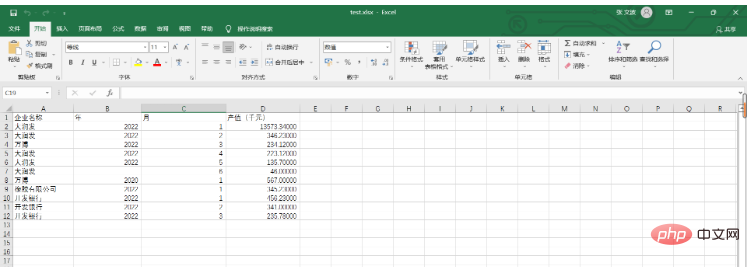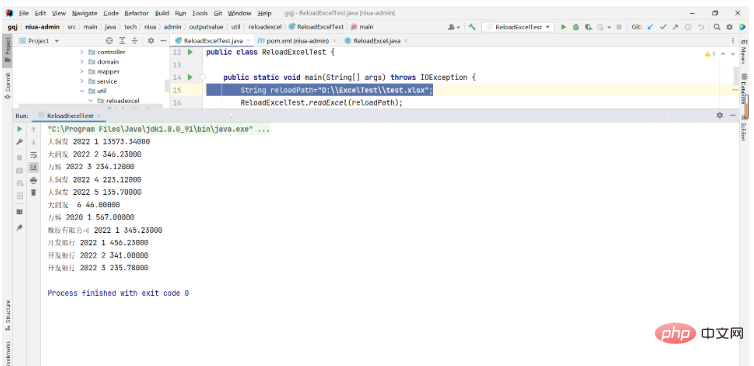
用户可以直接读取本地文件,也可以通过上传文件的形式读取excel
注意:poi对于读取到空白行的时候,会默认的认为是最后一行,将不会再读取空白行下面的数据
<dependency>
<groupId>org.apache.poi</groupId>
<artifactId>poi</artifactId>
<version>4.1.2</version>
</dependency>
<dependency>
<groupId>org.apache.poi</groupId>
<artifactId>poi-ooxml</artifactId>
<version>4.1.2</version>
</dependency>创建ReloadExcelTest .java文件
此时找到excel的文件路径,写文件全名:路径+文件全名
例:String reloadPath=“D:\ExcelTest\test.xlsx”;
windows路径之间加\\
测试
package tech.niua.admin.outputvalue.util.reloadexcel;
import org.apache.poi.ss.usermodel.*;
import org.apache.poi.xssf.usermodel.XSSFSheet;
import org.apache.poi.xssf.usermodel.XSSFWorkbook;
import tech.niua.admin.outputvalue.domain.OutputValue;
import java.io.IOException;
public class ReloadExcelTest {
public static void readExcel(String reloadPath) throws IOException {
//1.获取工作簿
XSSFWorkbook workbook = new XSSFWorkbook(reloadPath);
//2.获取工作表
XSSFSheet sheet = workbook.getSheetAt(0);
//获取行
//cell.setCellType(Cell.CELL_TYPE_STRING); //将不同类型的数据类型转为String
int lastRowNum = sheet.getLastRowNum();
for (int i = 1; i <= lastRowNum; i++) {
OutputValue outputValueEntity = OutputValue.builder().build();
Row rowValue = sheet.getRow(i);
//获取每一行中每一个单元格的数据的数据
for (int j = 0; j < 4; j++) {
DataFormatter formatter = new DataFormatter();
String value = formatter.formatCellValue(rowValue.getCell(j));
System.out.print(value+" ");
}
System.out.println();
}
}
}注意:4.1.2版本的poi已经不在使用cell.setCellType(Cell.CELL_TYPE_STRING);这种对于读取到数据设置为String类型的这种形式,将不再支持
改用为:
DataFormatter formatter = new DataFormatter();
String value = formatter.formatCellValue(rowValue.getCell(j));
此时value就是我们读取到的值,可以做一个相应的转换存储到集合或者对象的形式接收
测试
public static void main(String[] args) throws IOException {
String reloadPath="D:\\ExcelTest\\test.xlsx";
ReloadExcelTest.readExcel(reloadPath);
}

我们可以用集合的形式接收,或者以集合对象的形式接收,这样就能够对于读取到的数据做一个操作处理,以便于后面实现批量上传功能。
----->批量上传:前端页面上传excel文件,由系统自动导入excel的数据到数据库
Ce qui précède est le contenu détaillé de. pour plus d'informations, suivez d'autres articles connexes sur le site Web de PHP en chinois!
 Java
Java
 syntaxe des expressions régulières Java
syntaxe des expressions régulières Java
 Comparez les similitudes et les différences entre deux colonnes de données dans Excel
Comparez les similitudes et les différences entre deux colonnes de données dans Excel
 Marquage de couleur du filtre en double Excel
Marquage de couleur du filtre en double Excel
 Est-il difficile d'apprendre Java par soi-même ?
Est-il difficile d'apprendre Java par soi-même ?
 java configurer les variables d'environnement jdk
java configurer les variables d'environnement jdk
 Comment copier un tableau Excel pour lui donner la même taille que l'original
Comment copier un tableau Excel pour lui donner la même taille que l'original
 Java conserve deux décimales
Java conserve deux décimales